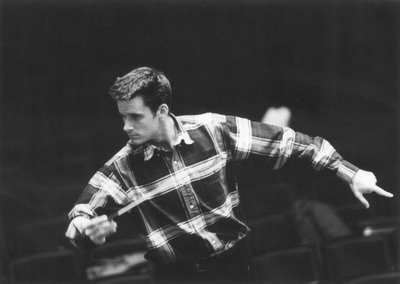
I attended my first opera at the Met in late April or early May of 2001. I was in the second row of the orchestra--not bad for my first time, huh?--and Catherine Malfitano sang her legendary Emilia Marty on the closing night of the season. Though I had been attending classical performances since 1994, this was my first in a great house.
One thing I noticed was the visibility of the conductor, who stands on a rather high platform. (As a matter of fact, the orchestra is very visible at the Met. More on this another time.) The conductor at my first Met evening was none other than Sir Charles Mackerras, a man so closely associated with the operas of Leoš Janáček that I couldn't help but count his presence among the highlights of my Met initiation.
However, at this performance, and at all but two of the 23 other Met operas I have attended since, I don't believe I ever paid the slightest attention to the conductor. The first exception was that evening last September when, once again, I sat in the second row of the orchestra, this time in the very center and therefore directly behind Jesus Lopez-Cobos, who frequently blocked my view of Renee Fleming in Manon.
The second exception occurred on Saturday afternoon at the matinee of Carmen. I'm talking about Philippe Jordan. When he walked out, I was struck by his youthful looks. It turns out he was born in 1974. He made his Met debut in 2002. But I didn't know any of this during the performance. I only knew that I was so sucked in by his energy and charm that I spent half of the performance with my eyes on him, even at the height of the over-the-top spectacle of this production.
A ball of enery, he seemed to breathe this work, throwing wicked smiles here and there, sometimes bending down so low that he disappeared, and, most strikingly to me, mouthing during every chorus bit! Without fail. And even during some of the arias, he "sang" along, especially at cadenzas, holding his mouth wide open, as if he were the one singing. He commanded what sounded to my ears like a taut performance from that glorious orchestra. From my sixth-row orchestra seat, fortuitously located to the side, it was hard to focus on Marcello Giordani (not in his best voice that afternoon, with a good deal of difficulty in transitioning between registers) and what's-her-name who sang Carmen (gorgeous sound--evenness in all registers; warm, rich tone--but, physically, poorly cast).
At least there was Escamillo. Escamillo is supposed to embody masculinity, virility, all that. Like the Met production, he has to be played over-the-top. And Erwin Schrott certainly did that, even miming the muttering of sweet nothings and making extensive eye contact with Carmen and the other ladies. Oh, and Ana Maria Martinez, in her debut role in the Met, was a stunning Micaela. She has a gorgeous, elegant sound. It's not a metallic sound; it's more like a good light cream. I'm sure she'll be a big hit at her London Traviatas.
No comments:
Post a Comment